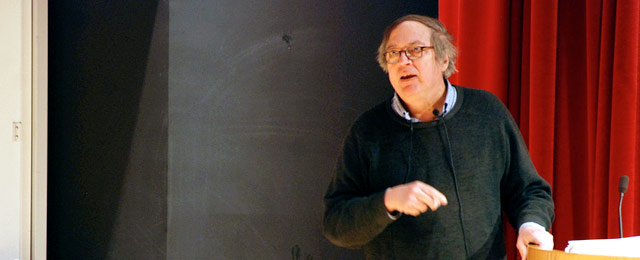European Civilization, 1648-1945

This course offers a broad survey of modern European history, from the end of the Thirty Years’ War to the aftermath of World War II. Along with the consideration of major events and figures such as the French Revolution and Napoleon, attention will be paid to the experience of ordinary people in times of upheaval and transition. The period will thus be viewed neither in terms of historical inevitability nor as a procession of great men, but rather through the lens of the complex interrelations between demographic change, political revolution, and cultural development. Textbook accounts will be accompanied by the study of exemplary works of art, literature, and cinema.
This Yale College course, taught on campus twice per week for 50 minutes, was recorded for Open Yale Courses in Fall 2008.
Syllabus
This course offers a broad survey of modern European history, from the end of the Thirty Years’ War to the aftermath of World War II. Along with the consideration of major events and figures such as the French Revolution and Napoleon, attention will be paid to the experience of ordinary people in times of upheaval and transition. The period will thus be viewed neither in terms of historical inevitability nor as a procession of great men, but rather through the lens of the complex interrelations between demographic change, political revolution, and cultural development. Textbook accounts will be accompanied by the study of exemplary works of art, literature, and cinema.
Browning, Christopher. Ordinary Men. New York: Harper Perennial, 1998.
Merriman, John. A History of Modern Europe: From the Renaissance to the Present. 2nd ed. New York: W. W. Norton & Company, 2004.
Orwell, George. Homage to Catalonia. New York: Harvest Books, 1980.
Smith, Helmut. The Butcher’s Tale. New York: W. W. Norton & Company, 2003.
Winter, Jay. Sites of Memory, Sites of Mourning: The Great War in European Cultural History. Cambridge: Cambridge University Press, 1998.
Zola, Emile. Germinal. London: Penguin Books, 2004.
There will be weekly discussion sections, a midterm examination, several superb films, a final examination, and a short (6-8 pages), fun paper.
Grades will be determined by equally weighing the midterm, final and paper grades.
Sessions
| Lecture 1 | Introduction |
| Lecture 2 | Absolutism and the State |
| Lecture 3 | Dutch and British Exceptionalism |
| Lecture 4 | Peter the Great |
| Lecture 5 | The Enlightenment and the Public Sphere |
| Lecture 6 | Maximilien Robespierre and the French Revolution |
| Lecture 7 | Napoleon |
| Lecture 8 | Industrial Revolutions |
| Lecture 9 | Middle Classes |
| Lecture 10 | Popular Protest |
| Lecture 11 | Why No Revolution in 1848 in Britain |
| Lecture 12 | Nineteenth-Century Cities |
| Lecture 13 | Nationalism |
| Lecture 14 | Radicals |
| Lecture 15 | Imperialists and Boy Scouts |
| Lecture 16 | The Coming of the Great War |
| Lecture 17 | War in the Trenches |
| Lecture 18 | Sites of Memory, Sites of Mourning (Guest Lecture by Jay Winters) |
| Lecture 19 | The Romanovs and the Russian Revolution |
| Lecture 20 | Successor States of Eastern Europe |
| Lecture 21 | Stalinism |
| Lecture 22 | Fascists |
| Lecture 23 | Collaboration and Resistance in World War II |
| Lecture 24 | The Collapse of Communism and Global Challenges |